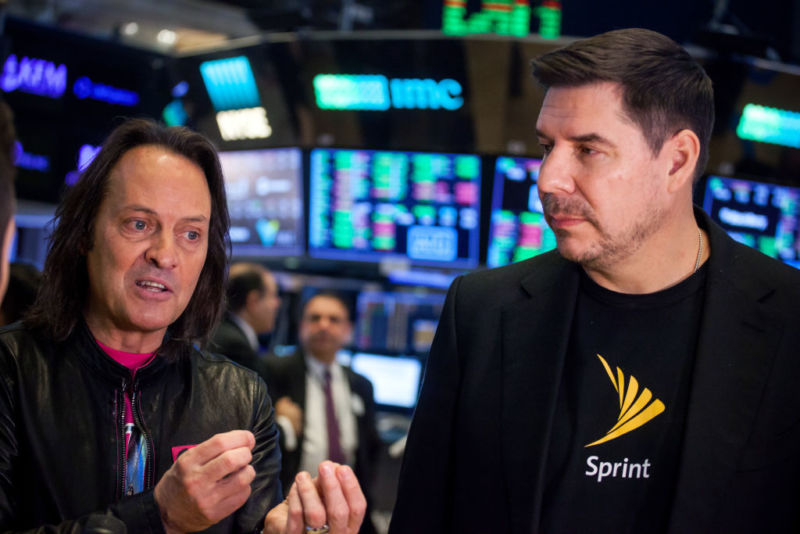
Sprint Executive Chairman Marcelo Claure tweeted this morning that Sprint will build "one of the best networks in the world" even if it isn't allowed to merge with rival T-Mobile USA.
"Merger or no merger, Sprint presses ahead with KC network buildout. Kansas City will have one of the best networks in the world," Claure tweeted.
Merger or no merger, Sprint presses ahead with KC network buildout. Kansas City will have one of the best networks in the world. [Investor info: https://t.co/UEdbA4edyt] https://t.co/OtDBYbWM1W
— MarceloClaure (@marceloclaure) May 31, 2018
Claure linked to a Kansas City Business Journal article, which has the headline "Merger or no merger, Sprint presses ahead with KC network buildout." Claure's tweet used the same phrasing as the Business Journal story while adding his opinion that "Kansas City will have one of the best networks in the world."
So why does Sprint need to merge with T-Mobile? In another tweet that could be read as contradicting itself, Claure wrote today, "we announced a mega-merger with our fiercest rival T-Mobile to create robust competition in the 5G era."
Claure deleted original version of tweet
Claure deleted the original version of his "Merger or no merger" tweet, but Google's cache quickly saved a copy. We wondered why Claure deleted the tweet, so we asked Claure on Twitter and sent an email with the same question to Sprint's public relations team. Eleven minutes later, Claure posted the new version of the tweet, which hasn't been deleted. Claure's new tweet used the same text but added a link to a disclaimer for investors.
UPDATE: Claure told us after this story published that he deleted and re-posted the tweet because he "needed to add the link to our site explaining the merger."
Claure's statement about Sprint's network-building ability may undercut the T-Mobile/Sprint argument that they can't effectively compete against AT&T and Verizon Wireless as separate companies.
While the tweet referred only to Kansas City, Sprint has continually touted its ability to upgrade its network across the US and compete in its present form. Months before announcing the plan to merge with T-Mobile, Claure told investors that Sprint's "strong spectrum assets" will enable "Sprint to be the leader in the true mobile 5G."
But upon announcing the merger, T-Mobile and Sprint said that "Neither company standing alone can create a nationwide 5G network with the breadth and depth required to fuel the next wave of mobile Internet innovation in the US and answer competitive challenges from abroad."
Sprint announced "the best profitability in company history" thanks to growth in its customer base just days after announcing the merger plan. Claure touted those best-ever results in another tweet today.
“Fun times fighting with T-Mobile”
Claure was Sprint's CEO for four years. His last day as CEO was yesterday, but he's staying on as executive chairman of Sprint's board and an executive at Sprint owner SoftBank. Former Sprint CFO Michel Combes has taken over the CEO position.
Claure reminisced about his time as Sprint CEO in his series of tweets today, noting that he "had fun times fighting with [T-Mobile CEO] John Legere and T-Mobile" and posting a picture of the two executives play-fighting.
We had fun times fighting with @JohnLegere and @TMobile - ESPECIALLY during #SB49 - remember that one @JohnLegere? LOL! https://t.co/ak9F3CqiwF pic.twitter.com/f1QtF0dCq0
— MarceloClaure (@marceloclaure) May 31, 2018
The Department of Justice must review the T-Mobile/Sprint merger to determine whether it violates antitrust laws, while the Federal Communications Commission must determine whether it harms the public interest. A key question for regulators will be the impact on customer access to modern networks at affordable prices.
A 2014 report issued by the Organisation for Economic Co-operation and Development (OECD) found clear consumer benefits from the presence of four carriers instead of three.
"Competition in mobile markets benefits consumers by offering them better services, quality and price discipline," the report said. "Particularly in countries with four or more mobile operators these benefits are visible through more competitive and more inclusive offers and services that are generally not available in countries with three mobile operators. When new entrants act as challengers they drive existing operators to improve their offers and performance."
If Sprint and T-Mobile are allowed to merge, the US will be left with three major nationwide wireless carriers.
reader comments
68